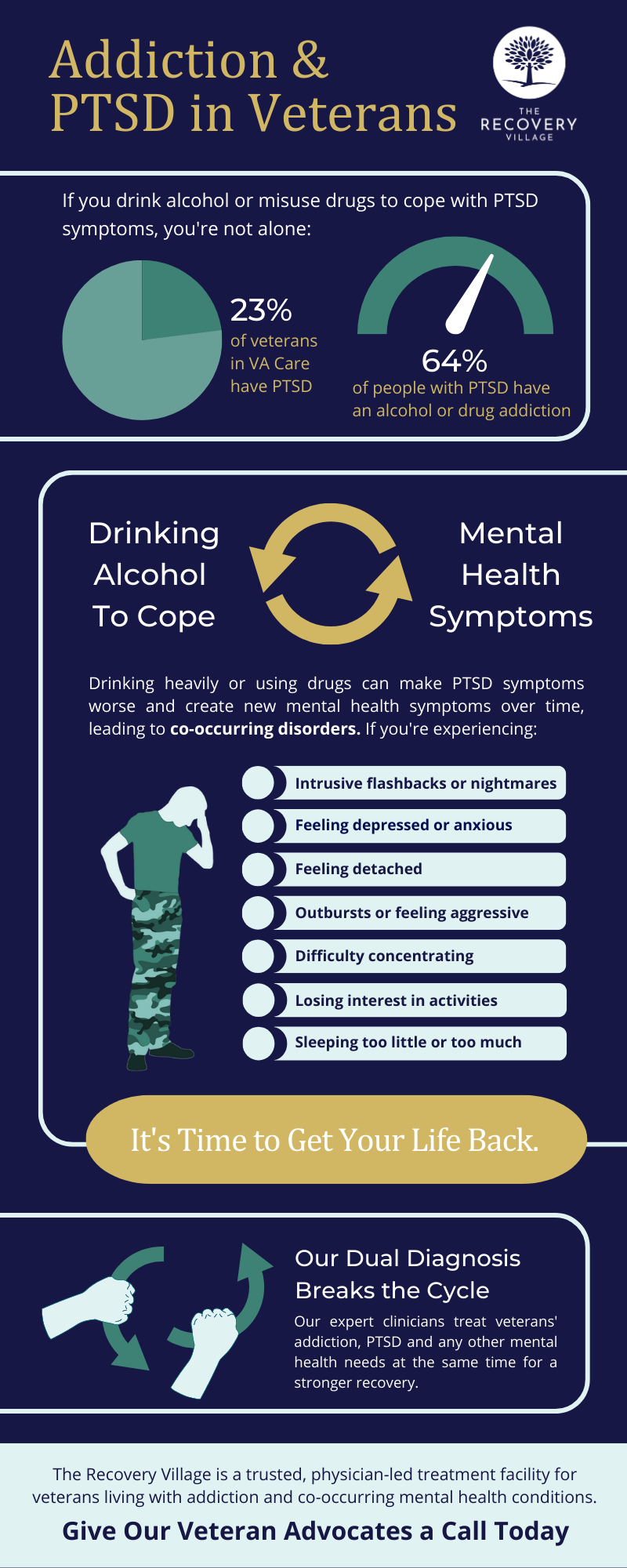Co-occurring disorders in veterans are common, but treatment programs at The Recovery Village Columbus can help them recover.
Many veterans do not seek help to address the emotional and physical effects of the trauma they experienced during service. This may lead some veterans to find other ways to manage mental health challenges, including self-medicating with drugs or alcohol. Co-occurring disorders treatment can help veterans overcome the effects of trauma and other difficulties arising from their service.
Understanding Co-occurring Disorders
Co-occurring disorders is when a person has both a substance use disorder and a mental health condition. There is a strong overlap between addiction and mental illness. Substance use disorders come with problems that can compound the mental health challenges that veterans are already facing.
Individuals with a substance use disorder may also have symptoms of the following:
This Season, Give Yourself the Gift of a Fresh Start.
Whether you are struggling with addiction, mental health or both, our expert team is here to guide you every step of the way. Don’t wait— reach out today to take the first step toward taking control of your life.
- Generalized anxiety disorder
- Panic disorder
- PTSD
- Depression
- Bipolar disorder
- ADHD
- Psychosis
- Borderline personality disorder
- Antisocial personality disorder
- Schizophrenia.
When a person has co-occurring disorders, an integrated treatment that addresses both conditions at the same time is the preferred option.
If you’re seeking co-occurring disorders treatment for veterans, FORTITUDE offers a specialty treatment track just for this population. Learn more at our website.
Co-occurring Disorders in Veterans
Studies show that co-occurring mental health disorders and addictions are common in veterans. PTSD, depression and adjustment disorders are common psychiatric diagnoses in this population. Veterans may use drugs or alcohol to help them cope with symptoms of these mental health disorders, which worsens matters. In fact, those using drugs as a coping mechanism are at increased risk of suicidality.
Furthermore, many veterans with mental health conditions do not seek treatment. They may worry that it is ineffective or will interfere with work. Without professional treatment for their symptoms, veterans may turn to drugs and alcohol to self-medicate.
Another problem that can contribute to substance misuse in veterans is chronic pain. One study found that nearly half of the veterans returning from Iraq and Afghanistan struggled with pain. Another study found that almost half of the veterans wounded in combat misused prescribed opioids. Veterans who misuse these medications can develop substance use disorders, even if they are taking prescribed medications.
PTSD and Substance Abuse in Veterans
The combat experience is intense and traumatic. According to the Department of Veterans Affairs, 15% of veterans serving during Operations Iraqi Freedom (OIF) and Enduring Freedom (OEF) have PTSD. During their service, veterans can develop PTSD due to exposure to death and threats of serious bodily harm. PTSD symptoms include:
- Intrusive thoughts
- Inability to experience positive moods
- Angry outbursts
- Startling easily
- Avoidance of remembering the event
After their service, veterans may not always have proper mental health support, and they may turn to substances to help them cope with these symptoms.
According to research, the co-occurrence of alcohol use disorder and post-traumatic stress disorder (PTSD) is common in veterans. Around one-fifth of veterans with PTSD also have an alcohol use disorder. Alcohol and other substances may become a method of numbing or self-medicating PTSD symptoms like sleep disturbances, flashbacks and hypervigilance. Over time, as a person continues to use substances to treat mental health symptoms, they are at risk of developing an addiction.
Veterans who experience sleep disturbances because of PTSD or mood disorders may misuse sedatives to cope. One study found that having highly disturbed sleep increased the risk of sedative misuse in veterans by 73%.

Recognizing the Signs of Substance Abuse in Veterans
The Department of Veterans Affairs reports the following signs of substance use may appear in veterans:
- Urges to use drugs or alcohol
- Being unable to stop drinking or using drugs
- Placing oneself in hazardous situations because of substance use, such as drinking and driving
- Relationship problems arising from substance misuse
- Showing signs of sickness from withdrawal
- Developing a high tolerance for drugs or alcohol so that larger amounts are needed to achieve the same effects
Treating Co-occurring Disorders in Veterans
When veterans have co-occurring disorders, integrated treatment is preferred to address both conditions simultaneously. Some beneficial interventions for treating co-occurring disorders in veterans include:
- Cognitive behavioral therapy (CBT)
- Exposure therapy
- Cognitive processing therapy (CPT)
- Couples counseling
- The use of medications (especially to treat alcohol addiction)
- Eye movement desensitization and reprocessing (EMDR)
A treatment center can help to determine the best treatment modality for a specific patient. In many instances, co-occurring disorders treatment for veterans involves individual and group therapies to target mental health symptoms and symptoms of addiction. Some patients may benefit from taking medications and participating in counseling or therapy.
If you or someone you love is a veteran looking for mental health and addiction treatment, our FORTITUDE program is here to help. We offer a specialty treatment track for veterans at our Columbus, Ohio, facility and provide many recovery options, including a group just for veterans and first responders, EMDR therapy and family services. We offer medical detox and residential treatment and specialize in treating co-occurring disorders. Contact us today to learn more.









